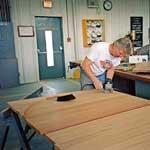BP Oil Spill Updates
- Rockdoc
-

- Mountain Legend
-

Vice Lord wrote: I've been monitoring this situation for days now so here's an update. BP is drilling two relief wells as we speak. They are drilling through the sand and dirt at the bottom of the ocean. The relief wells are uniquely designed to relieve the pressure on the Deep Horizon.. There is no exact timeline to when these wells will be operational because they have no idea what they will be drilling through. If they hit rock it could possibly take longer, and worst case if they hit granite or solid bedrocks they may not be able to drill through it at all, and they will be forced to abandon the operation completely. Those are our first two possible fixes, the third is what we call the Top Kill method. That is were they mix dirt with water which creates mud. The mud is then pumped down into the leaking well using a series of sophisticated pumps overwhelming the broken well head and eventually stopping the flow of sweet crude into the ocean.
Lets cross our fingers friends, and stay tuned for more updates.
Crossing finger is not going to help one bit. Knowing what is REALLY going on is more important and that is why i write the following.
I feel compelled to add some informed knowledge here to correct fundamental inaccuracies of the summation above as this IS a serious topic. Even if an oil company has never drilled in a area it's not a foray into the total unknown as portrayed. The stratigraphy of the Gulf of Mexico is one of the best understood geologic basins in the world. Companies have excellent seismic information as to what to expect in terms of lithology (rock). Unconsolidated (loose) sediment that has not been cemented to form sedimentary rock forms the uppermost part of the deposits. Below that hard rocks occur below the sea floor everywhere in the Gulf of Mexico. Granite is not present in the Gulf of mexico. Granite is an igneous intrusive of continental regions. Furthermore, there is nothing special about drilling granite, it is easier to drill than salt. If there were any granite, it would be over 30 thousand or more feet below the overburden of the sea floor. The one thing no one can accurately predict is over pressuring (abnormal pockets of pressure that are the main reason for most 'lost' wells. Dumping heavy mud into a well is tricky business because it has the same potential as hydrofracturing a well. If the mud is too heavy it invades the country rock splitting it open. and the oil gets diverted to new areas and may well find its way to the surface if there is no seal in place to stop it. This is why there are such things as natural oil leaks all the time and explorationists use them to discover new fields.
The relief wells are designed to do just that, tap into the reservoir to begin siphoning off oil. This really is no different than any other drilling operation except for one crucial point. They will make damn sure the blowout preventers have properly working hydraulics. In some ways, drilling this well is easier because they have lots of information about what to expect in terms of not only the formation characteristics but also the pressure profile in this part of the Gulf. Drilling will be taking a little longer than it normally does once they get near the reservoir. This is purely precautionary and general practice. Accidents happen in every line of work. This is no different. Someone screws up. Unlike other many other jobs, the consequences may be catastrophic.
Please Log in or Create an account to join the conversation.
- jf1acai
-

- Mountain Legend
-

In the Gulf oil spill, the feds, though talking big, have no clue what to do. BP, though maybe they should have, did not expect this big of a problem to ever happen. They are responding with everything they can think of.
It is uncharted territory, much like exploration of the West, space exploration, etc.
Nobody knows all the possible risks. Nobody knows exactly what might be required to cover a worst case scenario.
But of course, politicians, journalists, and other monday morning quarterbacks can always criticise.
I hope that efforts to stop the spill will succeed soon, and that unbiased investigation will reveal whether there was really negligence involved, or if it was truly an accident.
In either case, I hope that lessons are learned, and we can move forward safely.
We cannot quit trying new things, just because we don't know all of the possible effects. We also cannot quit learning everything we can thru failures, in order to help assure more successes in the future.
Experience enables you to recognize a mistake when you make it again - Jeanne Pincha-Tulley
Comprehensive is Latin for there is lots of bad stuff in it - Trey Gowdy
Please Log in or Create an account to join the conversation.
- UNDER MODERATION
-
 Topic Author
Topic Author
- Visitor
-

Rockdoc wrote:
Vice Lord wrote: I've been monitoring this situation for days now so here's an update. BP is drilling two relief wells as we speak. They are drilling through the sand and dirt at the bottom of the ocean. The relief wells are uniquely designed to relieve the pressure on the Deep Horizon.. There is no exact timeline to when these wells will be operational because they have no idea what they will be drilling through. If they hit rock it could possibly take longer, and worst case if they hit granite or solid bedrocks they may not be able to drill through it at all, and they will be forced to abandon the operation completely. Those are our first two possible fixes, the third is what we call the Top Kill method. That is were they mix dirt with water which creates mud. The mud is then pumped down into the leaking well using a series of sophisticated pumps overwhelming the broken well head and eventually stopping the flow of sweet crude into the ocean.
Lets cross our fingers friends, and stay tuned for more updates.
Crossing finger is not going to help one bit. Knowing what is REALLY going on is more important and that is why i write the following.
I feel compelled to add some informed knowledge here to correct fundamental inaccuracies of the summation above as this IS a serious topic. Even if an oil company has never drilled in a area it's not a foray into the total unknown as portrayed. The stratigraphy of the Gulf of Mexico is one of the best understood geologic basins in the world. Companies have excellent seismic information as to what to expect in terms of lithology (rock). Unconsolidated (loose) sediment that has not been cemented to form sedimentary rock forms the uppermost part of the deposits. Below that hard rocks occur below the sea floor everywhere in the Gulf of Mexico. Granite is not present in the Gulf of mexico. Granite is an igneous intrusive of continental regions. Furthermore, there is nothing special about drilling granite, it is easier to drill than salt. If there were any granite, it would be over 30 thousand or more feet below the overburden of the sea floor. The one thing no one can accurately predict is over pressuring (abnormal pockets of pressure that are the main reason for most 'lost' wells. Dumping heavy mud into a well is tricky business because it has the same potential as hydrofracturing a well. If the mud is too heavy it invades the country rock splitting it open. and the oil gets diverted to new areas and may well find its way to the surface if there is no seal in place to stop it. This is why there are such things as natural oil leaks all the time and explorationists use them to discover new fields.
The relief wells are designed to do just that, tap into the reservoir to begin siphoning off oil. This really is no different than any other drilling operation except for one crucial point. They will make damn sure the blowout preventers have properly working hydraulics. In some ways, drilling this well is easier because they have lots of information about what to expect in terms of not only the formation characteristics but also the pressure profile in this part of the Gulf. Drilling will be taking a little longer than it normally does once they get near the reservoir. This is purely precautionary and general practice. Accidents happen in every line of work. This is no different. Someone screws up. Unlike other many other jobs, the consequences may be catastrophic.
Like the Sheriff's in Arizona you may be too close to the trees to see the forest here my friend..Let the goofballs in section 521 handle this one
Please Log in or Create an account to join the conversation.
- UNDER MODERATION
-
 Topic Author
Topic Author
- Visitor
-

jf1acai wrote: In Katrina, the feds were limited by the Stafford Act and past practices to responding only as requested, requests were inadequate, and it was a bigger problem than most expected. Nobody was properly prepared for it.
In the Gulf oil spill, the feds, though talking big, have no clue what to do. BP, though maybe they should have, did not expect this big of a problem to ever happen. They are responding with everything they can think of.
It is uncharted territory, much like exploration of the West, space exploration, etc.
Nobody knows all the possible risks. Nobody knows exactly what might be required to cover a worst case scenario.
But of course, politicians, journalists, and other monday morning quarterbacks can always criticise.
I hope that efforts to stop the spill will succeed soon, and that unbiased investigation will reveal whether there was really negligence involved, or if it was truly an accident.
In either case, I hope that lessons are learned, and we can move forward safely.
We cannot quit trying new things, just because we don't know all of the possible effects. We also cannot quit learning everything we can thru failures, in order to help assure more successes in the future.
Your bias is so obvious, "requests were inadequate"? A few days after Katrina I heard with my own ears the mayor of New Orleans literally crying, begging and screaming on the radio for Washington to "come down here and do something"..And of course, OF COURSE this oil spill could have been prevented. Did you just wake up yesterday? I'm sure there are any number things that could have prevented this, BP just didn't want to spend the money on it...
Please Log in or Create an account to join the conversation.
- Sunshine Girl
-

- Mountain Legend
-

- Posts: 3709
- Thank you received: 2
jf1acai wrote: In Katrina, the feds were limited by the Stafford Act and past practices to responding only as requested, requests were inadequate, and it was a bigger problem than most expected. Nobody was properly prepared for it. Obviously! But why the hell not!?!
It is uncharted territory, much like exploration of the West, space exploration, etc. I agree.
I hope that efforts to stop the spill will succeed soon, and that unbiased investigation will reveal whether there was really negligence involved, or if it was truly an accident. Agree as well.
In either case, I hope that lessons are learned, and we can move forward safely. Sooner than later hopefully.
We cannot quit trying new things, just because we don't know all of the possible effects. We also cannot quit learning everything we can thru failures, in order to help assure more successes in the future. Well said.
" I'll try anything once, twice if I like it, three times to make sure. " Mae West
Please Log in or Create an account to join the conversation.
- Rockdoc
-

- Mountain Legend
-

Clearly there is negligence if fittings on blowout preventer rams were not secured properly. That, should never happen given that most drilling operations double check and triple check critical components such as these. There are a few other practices reported that also will draw scrutiny in hindsight. Lost wells, some with detrimental environmental consequences, commonly result from drillers trying to "make hole" (drilling as fast as possible) at the expense of thoroughness with regard to safety. This is an outgrowth of contract structure in which the driller is paid by the footage drilled each day. BP now painfully knows how costly that can be. It's much like penny wise and dollar foolish.
What really has me concerned is the report of oil leaking at a distance from the borehole. This is a bad sign and potentially more problematic than the current mess BP has on it's hands. If true that oil is escaping elsewhere, then the relief wells may be totally inadequate. Plugging a hydro fractured subsurface is like trying to stop water from flowing through a spider web fracture by in a dam by using only your finger. To constrain the fracture from spreading and enlarging, pressure must be relieved at the second leak. This requires drilling yet another hole so the leak can be controlled and oil and gas collected.
This reminds me of the nuclear bomb proposal as the final resort for plugging this well. Such a move would be most ill advised consideration if the formation is already fractured and leaking oil from another location. All a bomb would do is fracture the seal more and create multiple new leaks in addition to the existing one.
BP has an unprecedented technological challenge on their hands. Our biggest contribution is to support their efforts to stem the tide in any way possible. Once the situation is under control, they will have to face the consequences of their blundering. I certainly would not want to own BP stock at this point.
Please Log in or Create an account to join the conversation.
- jf1acai
-

- Mountain Legend
-

It is very easy to criticise actions which have negative results, while at the same time applauding similar actions under different conditions which had positive results.
I find it difficult, though not impossible, to believe that hydraulic connections were not secured properly. As you pointed out, that definitely should have been caught and corrected. Perhaps this has been inaccurately reported, or is the result of something else. We don't know enough at this point to really say.
BP has an unprecedented technological challenge on their hands. Our biggest contribution is to support their efforts to stem the tide in any way possible.
I totally agree. And I do not believe that diverting resources, which could be used for solving the problem, to responding to Congressional hearings at this point is productive.
Experience enables you to recognize a mistake when you make it again - Jeanne Pincha-Tulley
Comprehensive is Latin for there is lots of bad stuff in it - Trey Gowdy
Please Log in or Create an account to join the conversation.
- Rockdoc
-

- Mountain Legend
-

And right you are. We have no first hand information. Well said.
Something I once heard was a question posed to the critics. "Where were you when the page was blank?" It's applicable across all disciplines of life.
Please Log in or Create an account to join the conversation.
- Rockdoc
-

- Mountain Legend
-

Now this is rather revealing information. If you can not plug the hole with junk (industry term used when pumping down an assortment of material designed to get caught up in large fractures and holes so that the rest of the mud can plug it up) you have a serious mud loss problem because there are so many high permeability pathways (like fractures or caves) that the junk fails to do its job. From this I'd conclude the formation is extensively fractured, perhaps even some as a result of the heavy mud. I suspect they fractured the formation with their attempted top kill. I wonder where they go next? This is not my area of expertise, though I do understand very well what they are doing. I simply do not know viable technology and engineering options and apparently they don't either.
Adding here that I just skimmed through the article and came away irked by the following misleading statement.
"Now, BP hopes to saw through a pipe leading out from the well and cap it with a funnel-like device using the same remotely guided undersea robots that have failed in other tries to stop the gusher.
This makes it seem that the robots failed in plugging the well instead of the procedure employed and a valid conclusion one might draw that the next attempt is going to fail also because they are using robots that failed before. Idiot. The robots did everything they were commanded to do. The failure was in ice clogging the brick out house they tried to put over the well and the stoppered pipe which failed to hold, etc.
This disaster is bad enough without fanning the flames further. :bash :bash :bash :Hellno:
Please Log in or Create an account to join the conversation.
- jf1acai
-

- Mountain Legend
-

Experience enables you to recognize a mistake when you make it again - Jeanne Pincha-Tulley
Comprehensive is Latin for there is lots of bad stuff in it - Trey Gowdy
Please Log in or Create an account to join the conversation.






